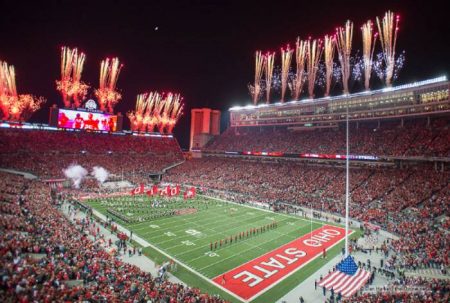
College Football’s Contentious Elements Irritate Josh Heupel, So He Decided To…

Josh Heupel is a figure who has spent much of his life in the world of college football. As both a former player and coach, he has witnessed and been a part of the sport’s ever-evolving landscape. However, in recent years, the world of college football has been marked by several contentious elements—issues ranging from the influence of the Name, Image, and Likeness (NIL) policy to the growing power of the transfer portal, as well as the increasing commercialization of the sport. These factors have shaped the way college football is played, watched, and, importantly, coached.
Heupel, a man known for his competitive spirit and dedication to building successful football programs, has been vocal about his frustrations with some of the changes in the sport. His journey as a coach, first at Central Florida and now at Tennessee, has been shaped by these very issues. Rather than sit idly by, Heupel has taken decisive steps to adapt to, and in some cases, challenge the direction in which college football is heading. This essay will explore the contentious elements of college football that irritate Josh Heupel and the actions he has taken to navigate and respond to these challenges.
The Contentious Elements in College Football
- The Transfer Portal
The introduction of the transfer portal in college football has fundamentally altered the landscape of player movement. Initially, players were required to seek permission from their coaches to transfer, which often led to a restrictive and opaque process. However, the portal has provided athletes with greater freedom to explore opportunities at other schools without waiting for permission. While this has been lauded as a victory for player autonomy, it has also led to an increase in roster turnover, with teams seeing significant changes in personnel from one year to the next.
For Heupel, the transfer portal presents both an opportunity and a challenge. While the portal allows him to bring in talented players from other programs, it also means that he must constantly manage his roster, deal with the uncertainty of who will remain on his team, and try to maintain continuity in his program. This instability is a sharp contrast to the traditional model of recruiting and developing players over a longer period.
- Name, Image, and Likeness (NIL)
Another major change in college football has been the introduction of NIL rights, which allow players to profit from their name, image, and likeness while still participating in college sports. While the policy has been hailed as a victory for athletes who have long been restricted from earning money through their fame, it has introduced a host of new challenges for coaches and programs.
The NIL landscape has created a highly competitive and often murky environment where schools and boosters with more financial resources can potentially offer players lucrative deals to attract them. This has sparked concerns about the growing disparity between programs, particularly when it comes to recruiting top-tier talent. Coaches like Heupel, who have historically relied on the traditional methods of team-building and player development, find themselves navigating a landscape where financial incentives are often as important—if not more important—than football performance.
- The College Football Playoff (CFP) System
The College Football Playoff system, which was implemented in 2014, was designed to provide a more equitable and transparent way of determining the national champion in college football. However, it has also been a point of contention for many in the sport, including Heupel. The CFP currently includes only four teams, which has led to calls for expansion, as many believe that the current format excludes deserving teams from having a shot at the championship.
For Heupel, the CFP’s limitations are frustrating, as they often lead to a system that feels elitist and excludes smaller conferences and teams outside of the traditional powerhouses. Heupel, who coached Central Florida to an undefeated season in 2017 but was left out of the playoff, is particularly attuned to the impact that this system has on non-power conference programs. This sense of inequity is something Heupel has openly criticized, believing that all teams, regardless of conference affiliation, should have a chance to compete for the title.
- Financial Disparities and the Commercialization of College Football
The growing commercialization of college football is another element that has drawn Heupel’s ire. The sport is more financially lucrative than ever before, with television contracts, sponsorship deals, and bowl games generating billions of dollars each year. However, the distribution of these funds has created significant disparities between programs, especially between Power Five conferences and Group of Five schools.
At Tennessee, Heupel is fortunate to be at a program with significant financial resources. However, he is acutely aware that many smaller programs struggle to compete on the same level, particularly when it comes to recruiting and facilities. The focus on revenue generation has also shifted the sport’s priorities, making it feel more like a business than an institution of higher learning. This commercialization, Heupel argues, detracts from the core values of college football—teamwork, player development, and the spirit of competition.
Heupel’s Perspective on the Issues
Josh Heupel’s frustration with the changing landscape of college football is rooted in his deep love for the game and his desire to preserve its integrity. His perspective on these issues is informed by both his experiences as a player and his current role as a coach.
As a former quarterback at Oklahoma, Heupel was part of a program that was a perennial contender for national championships. He knows what it takes to build a successful program, and he believes that certain changes in college football, particularly the financial arms race and the instability introduced by the transfer portal, threaten the traditional methods of building a cohesive and competitive team.
Heupel has also expressed concerns about the growing influence of outside factors, such as NIL deals and booster involvement, on recruiting and player development. He has made it clear that while players should be compensated for their likeness, he believes that the emphasis on money could overshadow the importance of developing young athletes into well-rounded individuals and football players.
His Response to College Football’s Challenges
Rather than simply complaining about the challenges that college football faces, Heupel has taken proactive steps to adapt and address these issues within his program. His approach is pragmatic and focused on maintaining Tennessee’s competitiveness, while also staying true to his values as a coach.
- Adapting to the Transfer Portal
Recognizing the inevitability of roster turnover due to the transfer portal, Heupel has embraced it as a tool for enhancing his team’s talent pool. At Tennessee, Heupel has utilized the portal to bring in key players who can make an immediate impact, while also emphasizing the importance of building a strong team culture. Heupel has balanced this by ensuring that his recruiting efforts continue to focus on developing homegrown talent and fostering long-term relationships with high school recruits.
- Navigating NIL with Integrity
In the face of the NIL era, Heupel has been cautious about how to integrate these new dynamics into his program. He understands that financial incentives are now a part of the recruiting landscape but has stressed that Tennessee’s success will be built on more than just money. Heupel has placed an emphasis on developing athletes as individuals, offering them opportunities for personal growth and long-term success, both on and off the field. He has also expressed a desire for a more transparent and regulated NIL system that ensures fairness across all programs.
- Advocating for Playoff Expansion
As a coach who has experienced the frustrations of being left out of the College Football Playoff despite a strong season, Heupel has been an advocate for expanding the playoff system to include more teams. He believes that expanding the playoff would provide more opportunities for deserving programs to compete for the national title and would help alleviate the current biases in the system that favor certain conferences and teams.
- Focusing on Team Development Amidst Financial Disparities
While Heupel recognizes the growing commercialization of college football, he remains focused on what he can control: developing his players, building a strong team culture, and creating a program that values discipline, hard work, and character. Despite financial disparities, Heupel believes that a well-coached team with strong leadership can still overcome the challenges presented by the larger forces at play in the sport.
Conclusion
Josh Heupel’s reaction to the contentious elements of college football has been marked by pragmatism, adaptation, and a commitment to preserving the sport’s core values. While he is certainly frustrated with some of the changes in the game, Heupel has responded by embracing the evolving landscape, using new tools like the transfer portal and NIL to strengthen his program, while also advocating for reforms that would make the sport more equitable.
As college football continues to navigate these changes, Heupel’s leadership will be an important force in shaping the future of the game. Whether it’s through his advocacy for playoff expansion or his efforts to maintain integrity in the recruiting process, Heupel is a coach who remains deeply committed to the values of college football, even in the face of its most contentious elements.





